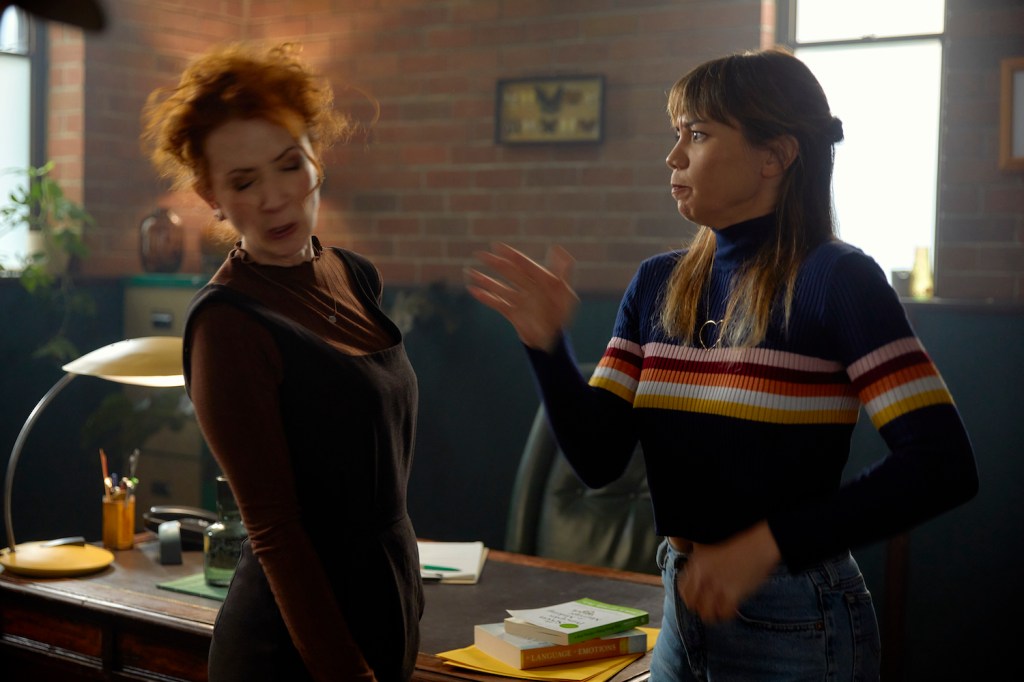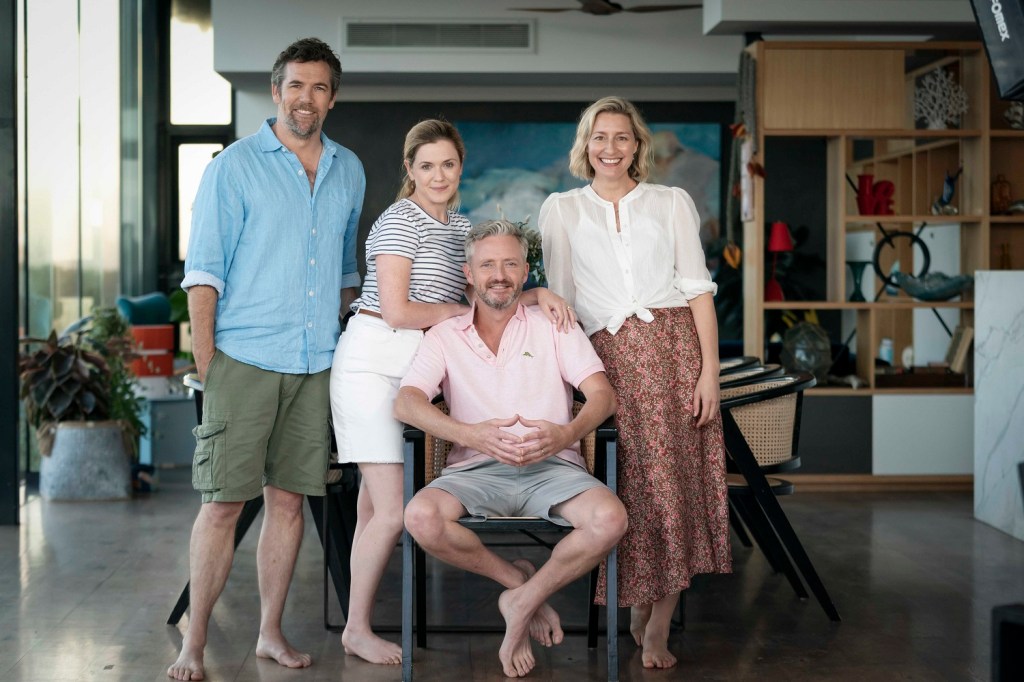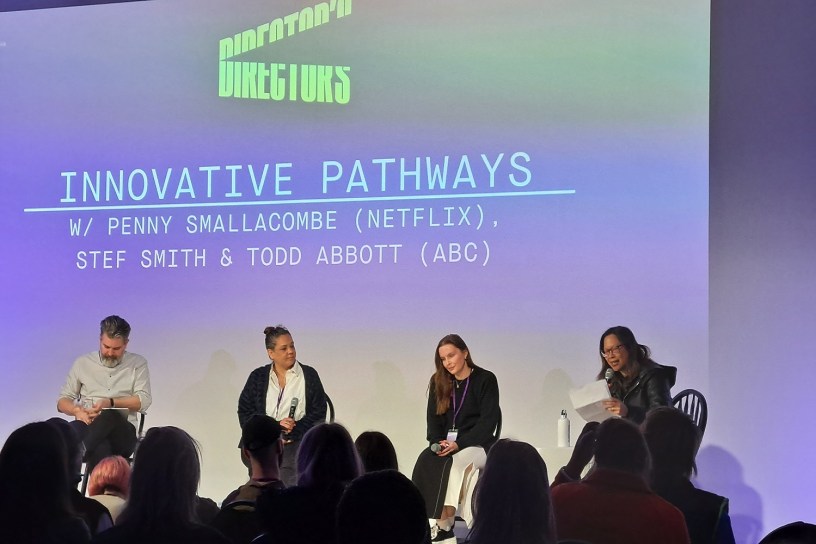Make content, network, push shit uphill, and pray to the moon.
That was the advice given to directors trying to get a foothold in the industry on Saturday, as Netflix ANZ Grow Creative manager Penny Smallacombe, ABC head of comedy Todd Abbott and writer and director Stef Smith came together for a panel discussion on career pathways.
It followed an anecdote from Smith, who had attempted to enter her web series It’s Fine I’m Fine into the Melbourne International FIlm Festival following its debut at Canneseries, only to be told she had missed the cut-off and could only make it in if there was a cancellation.
Following a call from her co-writer Ana Maria Belo, she took the step of putting water under the moon, adding crystals, and writing manifestations. It turned out to be effective, with Smith receiving a call the next day that there had been a cancellation of a project the same length as hers, leaving the door open for the magical realist black comedy to be included.
Smallacombe, who is tasked with overseeing Netflix’s initiative to expand and up-skill local talent, said that while unorthodox, the story served as an example of a director putting themselves out there and “getting things moving”.
“Not everyone is going to do as Stef has done, but we were talking out the back and Stef says she pushes shit up hills, and I think that’s a measure of everyone in the Australian film and television industry,” she said.
“There’s no doubt that it’s hard yards out there.”
Smith’s own journey as a filmmaker was brought into focus as part of the Director’s Cut session, with the Australian Directors Guild Award-winning commercial director detailing how It’s Fine I’m Fine was borne out of “career frustration” and the need to prove herself, as well as the desire to create a vehicle to “work with an ensemble of actors as well as an ensemble of writers and new voices”.

In creating 12-episode series, which follows a suburban psychologist as she helps her patients explore the mess, humour, melancholy, and magic of life, Smith used what she described as a “modular format” approach to the funding bodies, through whom she been cultivating relationships for more than 15 years.
“I said if I come in ‘low and fast’ and at a strategic time of year, can you support this as a talent escalator for a lot of people?” she said.
“So I went in for web series funding with the condition of it would go on Facebook and Facebook only.”
Despite working on a budget of less than $150,000, the finished product became the only Australian project to be selected for Canneseries in April, screening in the short-form competition.
However, the international recognition proved no guarantee of future success. Smith quit her admin job after being selected for the showcase, but then experienced “crickets” once episodes one and two were shown.
“We came back and a beautiful friend of mine asked me how it was and what I got out of it, and I was like, ‘I think I got some great photos wearing frocks that I bought on sale that I’ll show to my grandkids’.
“Nothing happened for a really long time and then I heard MIFF accepted episodic, but that I missed the deadline. I had done the Accelerator lab in 2018, so I emailed, spammed and begged.”
After eventually being accepted into MIFF, Smith also got the attention of SBS, who bought the title in a half-hour format, for which she was able to gain permission and convert within a space of two weeks.
Speaking from the position of fellow public broadcaster ABC, Abbott said committing to an idea and “finding someone who likes it” was often the pathway for innovative projects.
“Often incubators and other little initiatives are really well-intentioned, but the pure amount of admin and grief that it puts people like Stef through to fill out the forms and go through the process is often not worth it,” he said.
“What we’re doing at the moment is looking far more directly at things.”

Abbott cited the example of upcoming anthology Summer Love as an example of a well-established production company like Gritsmill doing something that allowed them to mentor other people.
“It’s eight stories, each of which is written by a different writing team, with four different directing combinations on them./ Each episode is directed solely or co-directed with a woman,” he said.
“None of them were a box-ticking exercise — the whole thing was, ‘Let’s just get some interesting stories’.”
Smallacombe, who previously ran Screen Australia’s First Nations department and was a producer for Bunya, highlighted that having decent work was “first and foremost” in being able to stand out from the crowd, but acknowledged that fewer short film funding opportunities had created an added challenge.
“I do wish there were more [short film] opportunities available to people from the states and Screen Australia.
“Lobby them all because they can be really fundamental to the development of your career.
“They show that you can direct and you can get great performance. They also show you to do you know how to create motion in a very short period of time which is quite amazing.”
She also said the value of making contacts at events like Director’s Cut could not be understated.
“Even if you say to someone, ‘I’ll be your assistant and just run around and follow you’, that’s a great way to hear the big conversations and see the stress that’s happening on the way back and forth,” she said.


